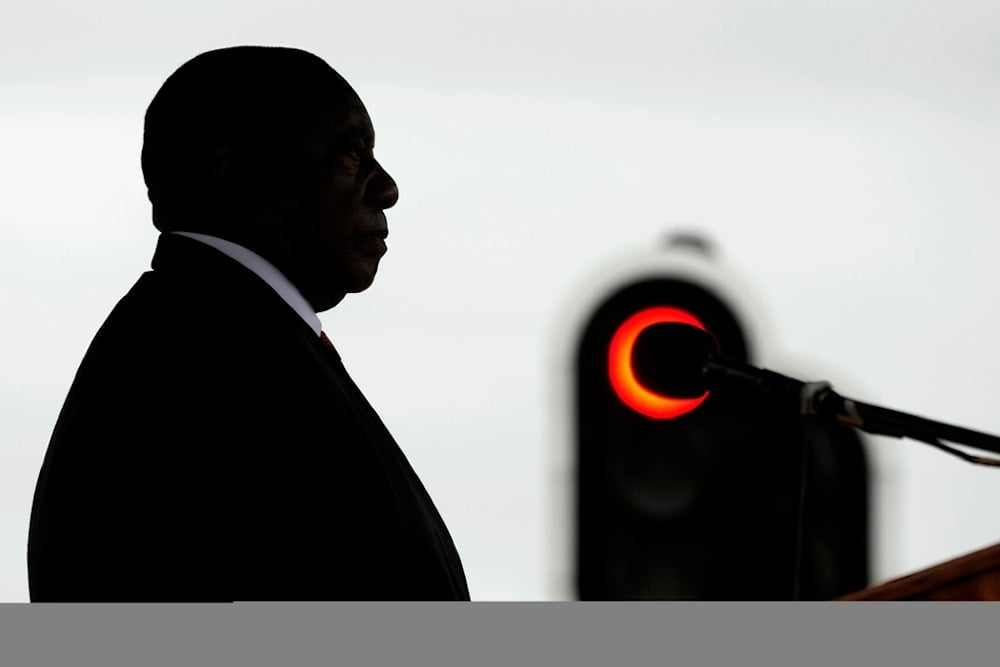South Africa threatens to withhold minerals amid US aid cut: FP
"They want to withhold funding, but they still want our minerals. … Let us withhold minerals. Africa must assert itself," Gwede Mantashe, South Africa's mineral and petroleum resources minister declared at the Mining Indaba conference in Cape Town on Monday.
-

South African President Cyril Ramaphosa is silhouetted as he addresses members of the defence forces during the Armed Forces Day, in Richards Bay, South Africa, Tuesday, February 21, 2023. (AP)
Foreign Policy on Wednesday published an analysis examining the implications of US President Donald Trump's recent decision to halt financial assistance to South Africa. The move comes in response to South Africa's newly enacted land reform law, which permits land expropriation without compensation under conditions deemed "just and equitable" in the public interest.
The legislation, signed by President Cyril Ramaphosa in January 2025, is intended to address lingering inequalities in land ownership more than three decades after the end of apartheid.
The majority of farmland in South Africa remains concentrated in the hands of white South Africans, who make up less than 10 percent of the population. Trump's administration argues that the expropriation policy unfairly targets white landowners, prompting the US to suspend aid.
Trump further stated that his government would investigate what he described as possible human rights violations linked to the policy.
Aid fallout
US assistance to South Africa has primarily supported health initiatives, including the President's Emergency Plan for AIDS Relief (PEPFAR). With funding now halted, concerns are rising over access to essential treatment for millions of South Africans living with HIV.
PEPFAR-supported clinics have already been affected, though some limited exemptions were announced over the weekend. The financial strain has led to uncertainty in the country's healthcare system, with experts warning of dire consequences if alternative funding is not secured.
Read more: Trump admin halts global supply of lifesaving HIV, malaria drugs
Billionaire entrepreneur Elon Musk, who was born in South Africa, has backed Trump's stance. Musk has been vocal in his criticism of the land reform law, accusing the South African government of policies that discriminate against white citizens.
His influence in the decision to cut aid has drawn both support and condemnation. In an attempt to address these concerns, President Ramaphosa reportedly reached out to Musk to clarify the objectives of the law and counter misinformation regarding its implementation.
President Ramaphosa responded to the US decision by pointing out that Washington's financial contributions to South Africa are limited, saying, "There is no other significant funding that is provided by the United States in South Africa."
However, officials in his administration have expressed concerns about the broader consequences of losing American financial backing, particularly in the health sector. The South African rand has also experienced a decline following the announcement, indicating potential economic repercussions.
Resource diplomacy
The controversy has also led to calls for economic retaliation. Gwede Mantashe, South Africa's mineral and petroleum resources minister and chairman of the ruling African National Congress, suggested that African nations should leverage their control over strategic resources.
"They want to withhold funding, but they still want our minerals. … Let us withhold minerals. Africa must assert itself," he declared at the Mining Indaba conference in Cape Town on Monday.
Beyond the dispute over land reform, South Africa has also taken a strong stance on international legal matters. On Friday, it joined eight other nations to establish the Hague Group, a coalition formed to uphold rulings from the International Court of Justice (ICJ) and the International Criminal Court (ICC).
The alliance, which includes Belize, Bolivia, Chile, Colombia, Honduras, Malaysia, Namibia, and Senegal, has vowed to refuse arms sales to "Israel", citing violations of international law.
Read more: South Africa, Malaysia launch campaign for justice protection

 4 Min Read
4 Min Read










